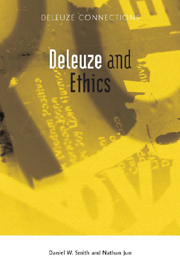Book contents
- Frontmatter
- Contents
- Acknowledgments
- Introduction
- 1 Whistle While You Work: Deleuze and the Spirit of Capitalism
- 2 The Ethics of the Event: Deleuze and Ethics without Aρχή
- 3 While Remaining on the Shore: Ethics in Deleuze's Encounter with Antonin Artaud
- 4 Responsive Becoming: Ethics between Deleuze and Feminism
- 5 Deleuze, Values, and Normativity
- 6 Ethics and the World without Others
- 7 Deleuze and the Question of Desire: Towards an Immanent Theory of Ethics
- 8 “Existing Not as a Subject But as a Work of Art”: The Task of Ethics or Aesthetics?
- 9 Deleuze, Ethics, Ethology, and Art
- 10 Never Too Late? On the Implications of Deleuze's Work on Death for a Deleuzian Moral Philosophy
- 11 Ethics between Particularity and Universality
- Notes on Contributors
- Index
7 - Deleuze and the Question of Desire: Towards an Immanent Theory of Ethics
Published online by Cambridge University Press: 12 September 2012
- Frontmatter
- Contents
- Acknowledgments
- Introduction
- 1 Whistle While You Work: Deleuze and the Spirit of Capitalism
- 2 The Ethics of the Event: Deleuze and Ethics without Aρχή
- 3 While Remaining on the Shore: Ethics in Deleuze's Encounter with Antonin Artaud
- 4 Responsive Becoming: Ethics between Deleuze and Feminism
- 5 Deleuze, Values, and Normativity
- 6 Ethics and the World without Others
- 7 Deleuze and the Question of Desire: Towards an Immanent Theory of Ethics
- 8 “Existing Not as a Subject But as a Work of Art”: The Task of Ethics or Aesthetics?
- 9 Deleuze, Ethics, Ethology, and Art
- 10 Never Too Late? On the Implications of Deleuze's Work on Death for a Deleuzian Moral Philosophy
- 11 Ethics between Particularity and Universality
- Notes on Contributors
- Index
Summary
My title raises two questions, each of which I would like to address in turn. What is an immanent ethics (as opposed to an ethics that appeals to transcendence, or to universals). And what is the philosophical question of desire? My ultimate question concerns the link between these two issues: What relation does an immanent ethics have to the problem of desire? Historically, the first question is primarily linked with the names of Spinoza and Nietzsche (as well as, as we shall see, Leibniz), since it was Spinoza and Nietzsche who posed the question of an immanent ethics in its most rigorous form. The second question is linked to names like Freud and Lacan (and behind them, to Kant), since it was they who formulated the modern conceptualization of desire in its most acute form – that is, in terms of unconscious desire, desire as unconscious. It was in Anti-Oedipus, published in 1972, that Deleuze (along with Félix Guattari, his co-author) attempted to formulate his own theory of desire – what he would call a purely immanent theory of desire. In his preface to Anti-Oedipus, Michel Foucault claimed, famously, that “Anti-Oedipus is a book of ethics, the first book of ethics to be written in France in quite a long time” (Foucault 1977: xiii) – thereby making explicit the link between the theory of desire developed in Anti-Oedipus and the immanent theory of ethics Deleuze worked out in his monographs on Nietzsche and Spinoza.
- Type
- Chapter
- Information
- Deleuze and Ethics , pp. 123 - 141Publisher: Edinburgh University PressPrint publication year: 2011



